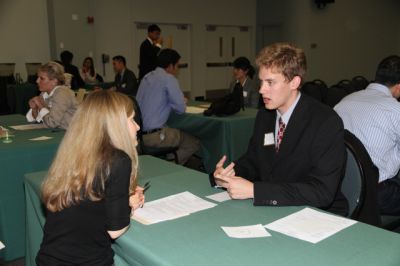Youth unemployment leads to a range of problems, from poverty to social
exclusion. The longer that young people stay unemployed, the harder it
is for them to ever enter the workplace.
But getting that first job is a daunting prospect. As well as having
less work experience than the generation above them, first-time job
seekers are at a disadvantage in interviews. The TARDIS project
(‘Training young Adults’ Regulation of emotions and Development of
social Interaction Skills’) is redressing that balance by offering young
people “virtual interviews” to practice their social competencies and
help them prepare for the real thing.
TARDIS – A vehicle for success
The designers of the system – a consortium of academics from the
Netherlands, Germany, France and the UK – have created a system that
uses ‘virtual agents.’
‘The platform provides a realistic interviewing environment, as
close as possible to real-life,’ says Dr Aurélie Jonquoy, the TARDIS
Project Manager. ‘TARDIS is a “serious game”, in which many potentially
limiting features of the real world are removed. As young people are
familiar with – and like – using computer games, the game aspect of
TARDIS is very important, in order to keep them motivated to train again
and again and as many times as they need.’
The system is made up of several parts: the user interacts with a
virtual interviewer via a webcam and an audio headset. The virtual
interviewer poses questions and gives realistic verbal and non-verbal
feedback, such as giving encouraging comments, or making gestures of
boredom or annoyance.
Helping young adults to manage interview stress
The system also has a sophisticated emotional model that allows it
to understand how the user is feeling, based on their body language and
tone of voice. This model allows the virtual interviewer to give
appropriate responses to the user. As an added feature, the user can see
at a glance where they looked confident and relaxed, and where they
appeared to be nervous.
The system is being promoted and offered to youth organisations
throughout Europe. One of the early adopters is the YMCA London South
West. Their Get On Track programme targets young people in economically
disadvantaged parts of London. Anna Harris, the Get On Track Project
Co-ordinator, explains why they have volunteered to pilot the system:
‘The reason for engaging in the TARDIS programme was to give the
young people some valuable interview practice and experience,’ she said.
‘I think having regular access to such a project would be fantastic as
it allows the young people see themselves in an interview situation and
have relevant key feedback which can help progress and refine their
interview skills. This will then reduce the pressure felt when attending
interviews and also set help in setting them up to win.’
‘With TARDIS, young people can explore their strengths and
weaknesses, and reduce their anxiety of applying and being interviewed
for jobs,’ said Dr Jonquoy, adding that the virtual agent will allow
over-stretched youth organisations to help many more disadvantaged young
people.
Link to project on CORDIS:
-
FP7 on CORDIS
Link to TARDIS project website
-
TARDIS website
Other links
-
European Commission's Digital Agenda website
